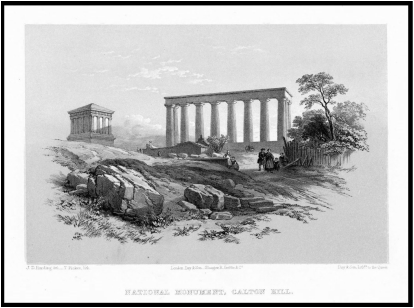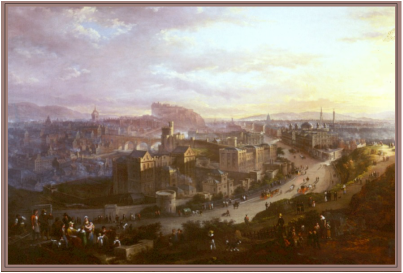CALTON HILL
During the early part of 1838 John Collins traveled extensively in Scotland campaigning for political reform. On 15th May 1838 a crowd of some 3,000 assembled on Calton Hill, Edinburgh to hear him speak. The following is a report from the Birmingham Journal and Scottish Pilot.
"SCOTLAND - AND THE FORTHCOMING DEMONSTRATION"
"Mr. John Collins, from Birmingham, was present, according to the promise he had made when he was last in Edinburgh. Mr. Collins, and the leaders of the (local) party, took their places on the hustings, erected in front of the National Monument, around and in front of which the multitude were congregated. Mr. Pratt was called to the chair.
|
"Mr. Collins addressed the assembly in remarkably temperate and judicious speech. Since coming to Scotland he hoped he might say, that he had the satisfaction of seeing the system of determined agitation set agoing in earnest, to accomplish the object for which it had been begun. It was the duty the people to work out their own political regeneration, because no one else there was do it for them. He might be told that all here present had the will to be free. That might be, — they might think that this and the other privilege should be theirs, but that of itself would never bring about a realisation of their wishes. No! if they wished to obtain their rights, the desire for these rights must not only be implanted within them, but they must boldly express that wish. They were all suffering under oppression, and they would continue so long they were in apathy and indifference about it.
"With regard the means, and the line of conduct which the people should pursue for the attainment of their wishes, Mr. Collins said, they ought it in a peaceful and legal manner, avoiding all appearance of offence, lest they should place themselves in a situation to justify the interference of the magistrates, and in that case retard, rather than forward, the object their search. "He presumed they were anxious to go along with the citizens in other places, who had already made up their minds to favour a great demonstration of their strength and influence. If he were right in this, he would advise them to be determined and unwavering; it was clearly the duty of every man to give his individual assistance to help it forward. The millions of the people were made of individuals, and what would become of them if all these individuals should keep back and refuse to act their part? "Mr. Collins then alluded to the hearty manner in which he had been received in all the places in Scotland which he had visited, and to the demonstrations which were to take place in Glasgow, on Monday, and in other places immediately after; and if they were determined to have one in Edinburgh, worthy themselves and of the cause, it would be essential benefit. |
|
"The following resolutions were unanimously agreed to:
"Ist. That this meeting highly approves of the plans and principles to be pursued by the Reformers of Birmingham, for the regeneration of our country, and determines them in the present noble struggle for liberty; that all confidence in the present House of Commons is lost, and that universal suffrage is the only remedy to bring about, in peaceful manner, those changes in the social and political condition the people, which would secure, to vast extent, their comfort, happiness, and independence.
"2nd. That this meeting strongly recommends an immediate organisation of the trades, with a view to make powerful and influential demonstration, a future day, in favour of popular rights.
"3rd. That a vote of thanks be given to the people of Birmingham for their noble efforts, on the present occasion, to rouse the slumbering energies of Britain; and, particularly, to Mr. Collins for his laborious efforts in the same cause in Scotland; and for coming to Edinburgh to address its assembled Reformers."
"Ist. That this meeting highly approves of the plans and principles to be pursued by the Reformers of Birmingham, for the regeneration of our country, and determines them in the present noble struggle for liberty; that all confidence in the present House of Commons is lost, and that universal suffrage is the only remedy to bring about, in peaceful manner, those changes in the social and political condition the people, which would secure, to vast extent, their comfort, happiness, and independence.
"2nd. That this meeting strongly recommends an immediate organisation of the trades, with a view to make powerful and influential demonstration, a future day, in favour of popular rights.
"3rd. That a vote of thanks be given to the people of Birmingham for their noble efforts, on the present occasion, to rouse the slumbering energies of Britain; and, particularly, to Mr. Collins for his laborious efforts in the same cause in Scotland; and for coming to Edinburgh to address its assembled Reformers."

